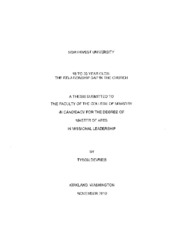| dc.contributor.author | Devries, Tyson | en |
| dc.date.accessioned | 2017-07-11T22:26:54Z | |
| dc.date.available | 2017-07-11T22:26:54Z | |
| dc.date.issued | 2010-11 | en |
| dc.identifier.uri | archives.northwestu.edu/handle/nu/25039 | |
| dc.description.abstract | This research project is a qualitative study that used a phenomenological approach to consider its primary research questions. Wildwood Community Church is the pseudonym for a church in rural western Washington and is the subject of this study. People between the ages of eighteen and thirty that have a history with Wildwood Community church were the participants. This study explores the experiences of people age eighteen to thirty have in attending Wildwood Community Church. The primary research questions are "what is their experience with being in a church setting and what causes them to stay or leave?" There were two sets of questions asked with the realization that one set is needed for those who continue to attend and one set for those who no longer attend Wildwood Community Church. For Millennials who continue to attend Wildwood Community Church the supplemental questions: 1) What things attracted you to Wildwood Community Church at first? 2) What kind of experience have you had with WCC that fosters continued participation in WCC faith community? 3) Do you find fulfillment for your perceived needs at WCC? For those who no longer have affiliation with WCC, the supplemental questions were: 1) What things attracted you to Wildwood Community Church at first? 2) What experience did you have at Wildwood Community Church that resulted in strong enough feelings to outweigh the original attraction? 3) Do you find fulfillment of your perceived needs at the church you are presently at if you attend a church? This project outlines a process of research to analyze the experience of Millennials and their experiences at Wildwood Community Church. Data was collected through eleven face-to-face interviews with eight females and 3 males. Four of the participants attend Wildwood Community Church only, three participants attend WCC as well as another church, and three no longer attend or have any affiliation with WCC. The data collected from the participants in the study shows the significance of relationships and their influence on whether Millennials choose to attend WCC or not. Three spheres emerged from the data that specifically applies to WCC and may be of use in understanding relationships with Millennials in other establishments. The role of church programs, the role of peer relationships, and the role of relationships with leaders are all themes that emerged from the data as factors in reaching, engaging, and retaining Millennials at WCC. These finding suggest that young people are looking to be where other young people are. Their absence from WCC however, is not related solely to differences among generations, but lack of authentic relationships primarily with leaders and secondarily with peers. While church programs play a role in facilitating relationships with leaders and peers, there must be an underlying comprehension of the importance of relationships. Therefore an active process to develop a broader leadership base through mentoring Millennials as well as readily involving members of the Millennial generation in substantive and meaningful roles. | en |
| dc.format.extent | 72 pages | en |
| dc.format.medium | PDF | en |
| dc.language.iso | en | en |
| dc.publisher | Northwest University | en |
| dc.rights | This original work is protected by copyright. Copyright is retained by the author(s). Works may be viewed, downloaded, or printed, but not reproduced or distributed without author(s) permission. | en |
| dc.rights.uri | http://archives.northwestu.edu/page/copyright | en |
| dc.title | 18 to 30 Year Olds: the Relationship Gap in the Church | en |
| dc.identifier.box | [112] | |
| thesis.degree.name | Masters of Arts in Missional Leadership | en |
| thesis.degree.level | Masters | en |
| thesis.degree.grantor | Northwest University | en |
| thesis.degree.discipline | College of Ministry | en |


 Maintained by the Northwest University Library
Maintained by the Northwest University Library